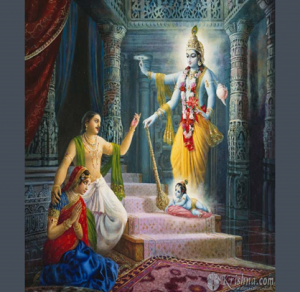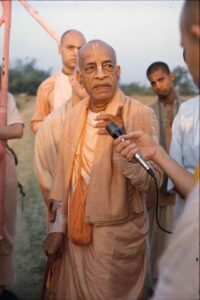Adi 6.42–Śrī Advaita Ācārya, however, considers Lord Caitanya Mahāprabhu His master, and He thinks of Himself as a servant of Lord Caitanya Mahāprabhu.
Similarly, a pure devotee wishes to be blessed like Mahārāja Prahlāda by being thus endowed with devotional service. Devotees also offer their respects to Hanumān, who always remained a servant of Lord Rāma. The great devotee Hanumān prayed:”I do not wish to take liberation or to merge in the Brahman effulgence, where the conception of being a servant of the Lord is completely lost.” Similarly, in the Nārada-pañcarātra it is stated: I do not want any one of the four desirable stations. I simply want to engage as a servant of the lotus feet of the Lord.”
PURPORTThe Bhakti-rasāmṛta-sindhu of Rūpa Gosvāmī explains the superexcellent quality of devotional service as follows: brahmānando bhaved eṣa cet parārdha-guṇī-kṛtaḥ naiti bhakti-sukhāmbhodheḥ paramāṇu-tulām api“If multiplied billions of times, the transcendental pleasure derived from impersonal Brahman realization still could not compare to even an atomic portion of the ocean of bhakti, or transcendental service.” (Bhakti-rasāmṛta-sindhu 1.1.38) Similarly, the Bhāvārtha-dīpikā states: tvat-kathāmṛta-pāthodhau viharanto mahā-mudaḥ kurvanti kṛtinaḥ kecic catur-vargaṁ tṛṇopamam“For those who take pleasure in the transcendental topics of the Supreme Personality of Godhead, the four progressive realizations of religiosity, economic development, sense gratification and liberation, all combined together, cannot compare, any more than a straw, to the happiness derived from hearing about the transcendental activities of the Lord.” Those who engage in the transcendental service of the lotus feet of Kṛṣṇa, being relieved of all material enjoyment, have no attraction to topics of impersonal monism. In the Padma Purāṇa, in connection with the glorification of the month of Kārttika, it is stated that devotees pray:“Dear Lord, always remembering Your childhood pastimes at Vṛndāvana is better for us than aspiring to merge into the impersonal Brahman. During Your childhood pastimes You liberated the two sons of Kuvera and made them great devotees of Your Lordship. Similarly, I wish that instead of giving me liberation You may award me such devotion unto You.” In the Hayaśīrṣīya-śrī-nārāyaṇa-vyūha-stava, in the chapter called Nārāyaṇa-stotra, it is stated: na dharmaṁ kāmam arthaṁ vā mokṣaṁ vā vara-deśvara prārthaye tava pādābje dāsyam evābhikāmaye“My dear Lord, I do not wish to become a man of religion or a master of economic development or sense gratification, nor do I wish for liberation. Although I can have all these from You, the supreme bestower of benedictions, I do not pray for all these. I simply pray that I may always be engaged as a servant of Your lotus feet.” Nṛsiṁhadeva offered Prahlāda Mahārāja all kinds of benedictions, but Prahlāda Mahārāja did not accept any of them, for he simply wanted to engage in the service of the lotus feet of the Lord.
King Kulaśekhara, in his very famous book Mukunda-mālā-stotra, prays: “My Lord, I do not worship You to be liberated from this material entanglement, nor do I wish to save myself from the hellish condition of material existence, nor do I ever pray for a beautiful wife to enjoy in a nice garden. I wish only that I may always be in full ecstasy with the pleasure of serving Your Lordship.” (M.m.s. 4)
In Śrīmad-Bhāgavatam also there are many instances in the Third and Fourth cantos in which devotees pray to the Lord simply to be engaged in His service, and nothing else (Bhāg. 3.4.15, 3.25.34, 3.25.36, 4.8.22, 4.9.10 and 4.20.24).
(Note-Here are those above verses)
SB 3.4.15–O my Lord, devotees who engage in the transcendental loving service of Your lotus feet have no difficulty in achieving anything within the realm of the four principles of religiosity, economic development, sense gratification and liberation. But, O great one, as far as I am concerned, I have preferred only to engage in the loving service of Your lotus feet.SB
SB 3.25.34--A pure devotee, who is attached to the activities of devotional service and who always engages in the service of My lotus feet, never desires to become one with Me. Such a devotee, who is unflinchingly engaged, always glorifies My pastimes and activities.
SB 3.25.36–Upon seeing the charming forms of the Lord, smiling and attractive, and hearing His very pleasing words, the pure devotee almost loses all other consciousness. His senses are freed from all other engagements, and he becomes absorbed in devotional service. Thus in spite of his unwillingness, he attains liberation without separate endeavor.
Adi 6.43--He forgets Himself in the joy of that conception and teaches all living entities, “You are servants of Śrī Caitanya Mahāprabhu.”
Adi 6.44-The conception of servitude to Śrī Kṛṣṇa generates such an ocean of joy in the soul that even the joy of oneness with the Absolute, if multiplied ten million times, could not compare to a drop of it.
Adi 6.45--The most beloved goddess of fortune resides on the chest of Śrī Kṛṣṇa, yet she too, earnestly praying, begs for the joy of service at His feet.
Adi 6.46–All the associates of Lord Kṛṣṇa, such as Brahmā, Śiva, Nārada, Śuka and Sanātana, are very much pleased in the sentiment of servitude.
Adi 6.47--Śrī Nityānanda, the wandering mendicant, is the foremost of all the associates of Lord Caitanya. He became mad in the ecstasy of service to Lord Caitanya.
Adi 6.49-50–Śrīvāsa, Haridāsa, Rāmadāsa, Gadādhara, Murāri, Mukunda, Candraśekhara and Vakreśvara are all glorious and are all learned scholars, but the sentiment of servitude to Lord Caitanya makes them mad in ecstasy.
Adi 6.51—Thus they dance, sing and laugh like madmen, and they instruct everyone, “Just be loving servants of Lord Caitanya.”



